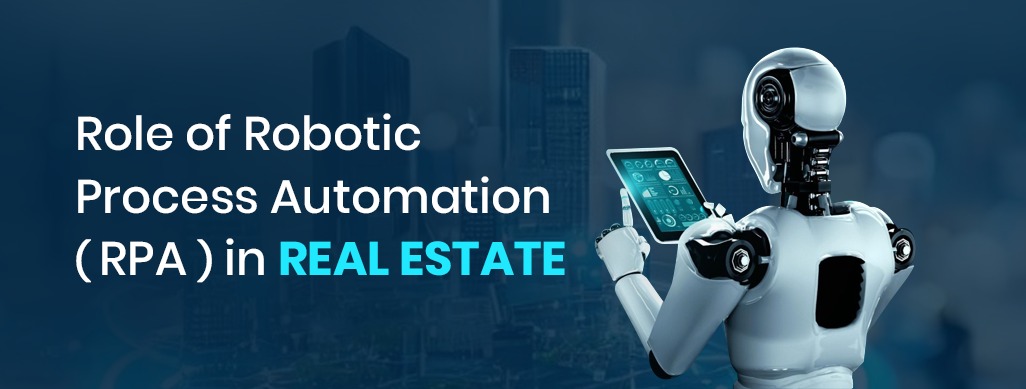
We use cookies to ensure that we give you the best experience on our website.
By using this site, you agree to our use of cookies. Find out more.
This blog delves into the world of RPA, exploring its definition, use cases, and the numerous benefits it can provide to real estate professionals and organizations, ultimately transforming the way business is conducted in this dynamic industry.

In the ever-evolving real estate industry, where efficiency and streamlined operations are paramount, Robotic Process Automation (RPA) has emerged as a game-changing technology. RPA offers a powerful solution to automate repetitive and rule-based tasks, freeing up valuable human resources to focus on more complex and strategic endeavors. As the demand for optimized processes and exceptional customer experiences continues to rise, the role of RPA in the real estate sector has become increasingly significant. This blog delves into the world of RPA, exploring its definition, use cases, and the numerous benefits it can provide to real estate professionals and organizations, ultimately transforming the way business is conducted in this dynamic industry.
Robotic Process Automation (RPA) is a technology that enables the automation of repetitive, rule-based tasks and processes through the use of software robots or "bots." These bots are designed to mimic the actions of a human interacting with computer systems and applications, performing tasks such as data entry, form filling, document processing, and workflow management. RPA operates by mapping a process and then using software to execute the required steps and interactions with various applications and systems. Unlike traditional automation methods, RPA does not require extensive system integration or changes to existing IT infrastructure, making it a relatively quick and cost-effective solution for automating business processes. RPA has gained widespread adoption across various industries, including finance, healthcare, and real estate, as organizations seek to improve operational efficiency, reduce costs, and enhance customer experiences.
Here are some key use cases of Robotic Process Automation ) in the real estate industry:

Tenant onboarding is a critical process in the real estate industry that involves collecting and verifying various documents, personal information, and financial details from prospective tenants. Robotic Process Automation (RPA) can streamline this process by automating tasks such as data entry, document verification, and email communication. With RPA, property managers can ensure consistency and accuracy throughout the onboarding process, reducing the risk of errors and delays. Additionally, RPA can automatically generate and send welcome packets, lease agreements, and other necessary documents to new tenants, saving time and improving overall efficiency. By leveraging RPA for tenant onboarding, real estate organizations can enhance the tenant experience while freeing up valuable human resources to focus on more complex tasks and customer interactions.
Sending payment reminders to tenants is a crucial task for property managers, as it helps ensure timely rent collection and maintains a steady cash flow. However, manually generating and distributing these reminders can be a time-consuming and tedious process, especially for large property portfolios. Robotic Process Automation (RPA) offers a solution by automating the entire payment reminder process. With RPA, property managers can set up automated workflows that generate and send customized payment reminders to tenants based on predefined schedules and criteria. These reminders can be sent via email, text messages, or even integrated with online payment portals. RPA ensures that reminders are sent consistently and accurately, reducing the risk of missed payments and late fees. Additionally, it frees up valuable time for property managers to focus on other critical tasks, such as tenant relations and property maintenance.
Effective portfolio management is crucial for real estate organizations to maintain a comprehensive overview of their properties, investments, and financial performance. Robotic Process Automation (RPA) can play a vital role in streamlining portfolio management tasks. RPA can automate data consolidation from various sources, such as property management systems, financial statements, and market reports, ensuring that portfolio managers have access to accurate and up-to-date information. Additionally, RPA can generate customized reports and analytics, providing insights into key metrics like occupancy rates, rental yields, and cash flows. This empowers real estate professionals to make informed decisions regarding property acquisitions, divestments, and strategic planning. Furthermore, RPA can assist in automating routine tasks like lease renewals, rent adjustments, and property valuation updates, ensuring that portfolio data remains current and enabling real estate organizations to maximize the value of their assets.
Implementing Robotic Process Automation (RPA) in the real estate industry can provide several benefits, including:
Robotic Process Automation (RPA) has the ability to significantly improve productivity in real estate offices. By automating repetitive and mundane tasks, such as data entry, document processing, and report generation, RPA frees up valuable time for employees to focus on more complex and strategic activities. This not only enhances overall efficiency but also allows real estate professionals to dedicate their efforts to tasks that require human judgment, creativity, and problem-solving skills. Additionally, RPA reduces the likelihood of errors associated with manual processes, resulting in improved accuracy and consistency. By streamlining workflows and minimizing administrative burdens, RPA empowers real estate organizations to operate with greater agility and responsiveness, ultimately leading to increased productivity and better utilization of human resources.
Implementing Robotic Process Automation (RPA) in real estate operations can generate significant cost savings, ultimately allowing the technology to pay for itself over time. By automating labor-intensive tasks, RPA reduces the need for manual effort, resulting in lower operational costs associated with salaries and employee overhead. Additionally, automated processes are typically faster and more accurate than manual counterparts, leading to further cost savings through improved efficiency and reduced errors. RPA also minimizes the risk of costly mistakes, such as missed deadlines or incorrect data entry, which can have substantial financial implications. As these cost savings accumulate, they can offset the initial investment in RPA technology and related implementation expenses, enabling the real estate organization to achieve a return on investment and realize long-term financial benefits.
Robotic Process Automation (RPA) can play a vital role in enhancing customer engagement within the real estate industry. By automating repetitive tasks, such as sending reminders, notifications, and updates, RPA ensures timely and consistent communication with tenants and clients. This proactive approach to communication not only improves the overall customer experience but also fosters trust and transparency. Additionally, RPA can facilitate seamless integration with customer relationship management (CRM) systems, providing real estate professionals with a comprehensive view of customer interactions and enabling personalized engagement strategies. Automated processes can also contribute to faster response times, addressing customer inquiries and concerns promptly. By leveraging RPA to streamline customer-facing operations, real estate organizations can differentiate themselves through superior service, ultimately enhancing customer satisfaction and loyalty.
Robotic Process Automation (RPA) plays a crucial role in maintaining the smooth flow of real estate business operations. By automating various processes, RPA ensures that critical tasks and workflows continue to run efficiently, even during periods of high workload or staff shortages. This consistency and reliability help mitigate operational risks and disruptions, enabling real estate organizations to maintain business continuity. Additionally, RPA's ability to handle high volumes of data and tasks helps streamline processes, reducing bottlenecks and delays that could potentially impact the overall flow of business. With automated processes in place, real estate professionals can focus their efforts on core activities, such as property acquisitions, lease negotiations, and client relationships, without being bogged down by administrative burdens. By leveraging RPA, real estate organizations can maintain agility and responsiveness, ensuring that their business operations continue to thrive in a dynamic and competitive market.
The role ofRobotic Process Automation in the real estate industry is undeniably profound. By automating routine tasks and processes, RPA empowers real estate organizations to achieve unprecedented levels of efficiency, cost savings, and customer satisfaction. From streamlining tenant onboarding and payment reminders to enhancing portfolio management and maintaining business continuity, the applications of RPA are vast and far-reaching. As the real estate sector continues to evolve and adapt to changing market conditions, embracing RPA will be crucial for staying competitive and delivering exceptional services. By leveraging the power of automation, real estate professionals can focus their efforts on strategic decision-making, relationship-building, and driving innovation, ultimately positioning their organizations for long-term success in this dynamic and ever-changing landscape.
Leave a Comment
Your email address will not be published.